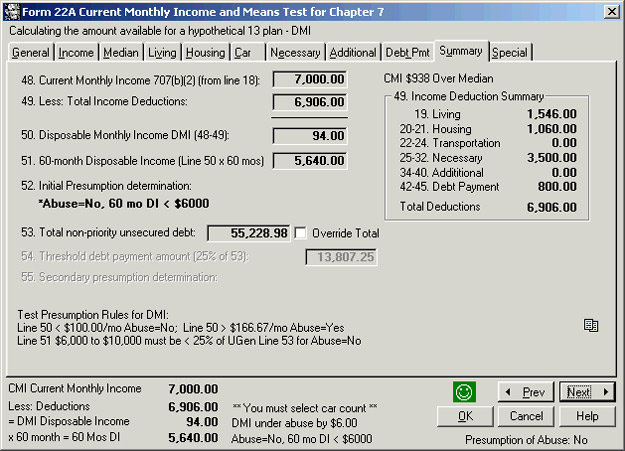 The holiday season is a time of celebration, but for many people it’s a time of year that brings added financial pressure while they struggle to keep up with payments on their existing debt. If you use credit cards to buy Christmas gifts, with the expectation of filing for bankruptcy to get rid of those holiday season debts, those purchases may lead to creditors to accuse you of fraud and those debts could be declared nondischargeable. In that situation, the timing of a bankruptcy filing needs to be carefully considered.
The holiday season is a time of celebration, but for many people it’s a time of year that brings added financial pressure while they struggle to keep up with payments on their existing debt. If you use credit cards to buy Christmas gifts, with the expectation of filing for bankruptcy to get rid of those holiday season debts, those purchases may lead to creditors to accuse you of fraud and those debts could be declared nondischargeable. In that situation, the timing of a bankruptcy filing needs to be carefully considered.
We recently discussed several aspects of bankruptcy with Christopher Holmes and Jess M. Smith, III, partners at Tom Scott & Associates, P.C. The discussion focused on how buying gifts with credit cards and other expenses during the holiday season can contribute to financial problems after the New Year begins. Other topics covered in the conversation include the impact of previous tax liabilities on a bankruptcy filing; federal tax refunds in relation to Indiana law and the IRS Code; the tax filing status of married couples who are separated and have children; and how filing for unemployment benefits or your immigration status might effect your bankruptcy filing.
The simplified explanations in this conversation cannot be taken as legal advise, because every situation is different and complicated. Each case is very fact-sensitive and there is no one-size-fits-all explanation of how a tax liability relates to a specific bankruptcy case.
Q: As the end of the year approaches, what advice can you offer to someone who is struggling financially and researching the possibility of declaring bankruptcy?
CH: Typically, we have a lot of clients who come to see us after Christmas and after they have incurred too much debt purchasing gifts for family members and friends. As a result, when those bills come due in January, February, and March, our clients come to the realization that those accumulated bills are unmanageable and those clients seek our assistance in alleviating the financial problems caused by their inadvertent overspending.
Also, we have had a few clients who have used their credit cards for the purchase of Christmas gifts with the expectation of filing bankruptcy to get rid of those debts. In such cases, the creditors may scrutinize the use – or in their opinion misuse – of credit cards right before the filing of a bankruptcy. As a result, those creditors can use a provision in the bankruptcy code that provides that debts of a certain amount incurred in a certain period of time shortly before the filing of a bankruptcy case are presumed to be a fraudulent and, as a further result, nondischargeable. In those rare cases, we must advise our clients accordingly and we must be more careful regarding the timing of the filing of those cases.
Q: In other words, if you know you’re in financial trouble, it’s not a good idea to think you can “go out with a bang” with one last buying binge right before declaring bankruptcy, because that might be declared a fraudulent act. Don’t make matters worse just because it’s the holiday season.
CH: Yes. Section 523 of the U.S. Bankruptcy Code which is entitled “Exceptions to Discharge” and which sets forth the different kinds of debts that are NOT dischargeable in a bankruptcy includes a section that pertains to consumer debts of a certain amount for luxury goods or services that are incurred within 90 days of when a bankruptcy case is filed, as well as cash advances of a certain amount that are incurred within 70 days of when a bankruptcy case is filed, are presumed to be nondischargeable.
Although the presumptive periods are 90 days and 70 days respectively, creditors will often look for suspicious usage in the 3 to 12 months before a bankruptcy case is filed in order to determine whether a compelling allegation can be made that a reasonable debtor must have known or should have known when they incurred those debts that those debts would never be repaid. If so, then the creditor can assert that those debts were incurred under false pretenses and, as a result, they are not dischargeable.
Q: Are there any end-of-year financial loose ends you can tie up to prepare for a bankruptcy filing after the first of the new year? What should someone take care of first to make filing for bankruptcy as smooth and easy a process as possible?
CH: First and foremost, we meet with some people who have significant income tax liabilities for prior tax years. Although we ask all of our clients about income tax liabilities, we need to know about taxes owed not only for prior tax years, but we need to be aware of income taxes that might be due and owing for the current tax year for which the tax returns are due in the next calendar year. If so, then we must defer the filing of their bankruptcy case until after January 1, so the taxes can be included in the Chapter 13 plan and then paid back without penalty or interest; otherwise, they are deemed to be a post-filing debt that is not included in their Chapter 13 Plan.
JS: I have a similar situation now with a Chapter 26 (i.e., back-to-back filings of two Chapter 13 bankruptcy cases), in which a debtor is coming out of Chapter 13 and he has just paid a bunch of taxes, but still owes much more. We’re also going to delay filing for bankruptcy until 2019, so we can include his 2018 taxes in the plan.
Q: Should someone in a deep financial hole start the process of contacting a bankruptcy attorney as soon as possible, even if they might not file a case until next year?
CH: We’ve learned that some people have never filed some of their tax returns, and those unfiled tax returns must be filed before we file their bankruptcy case. And we will urge those individuals to prepare and file those unfiled tax returns as soon as possible, so we know if income taxes are owed, how much is owed, and for which tax years they are owed, in order to properly advise them regarding whether a Chapter 7 or a Chapter 13 case is more appropriate to resolve their income tax problems. Also, the U.S. Bankruptcy Code includes a provision that requires that all unfiled income tax returns must be filed and copies provided to the Trustee; otherwise, the bankruptcy case can be dismissed.
Q: So, the first tip is you shouldn’t make your debt worse by spending a lot of money on holiday gifts. The second tip is to get your tax filing situation as clean as possible before filing for bankruptcy. Should the approaching end of the year be considered with regard to the sale of real estate or other assets?
CH: Yes, we always look at client’s income tax returns from prior tax years. Not only do we want to know if income taxes are owed, but we need to know if a client is expecting to receive a significant tax refund back from the IRS and/or from the State of Indiana because tax refunds are deemed to be an asset of their so-called bankruptcy estate.
If we file a Chapter 7 bankruptcy case before the debtor receives and spends the tax refund, it’s likely, if the refunds total more than a $1,000, the Chapter 7 trustee assigned to the case will intercept – or take – the refunds and use the proceeds to pay as much as possible to the creditors who file claims for their fair share thereof. Accordingly, we advise people to refrain from filing their bankruptcy case until after they’ve prepared and filed their tax returns, and then they’ve received and spent their tax refunds in an appropriate way. As a result, they don’t run the risk of the trustee taking the money and giving it to their creditors.
By the way, in many situations, most of the refund is the result of the Earned Income Tax Credit (EITC). The good news: Indiana law includes a provision whereby the portion of the refund that results from the EITC is exempt – or off limits – from being taken by the trustee for the benefit of the creditors.
Also, we deal with many clients who have filed their tax returns improperly. For example, married taxpayers can file their income tax returns jointly, or as a married person filing separate from their spouse, or as a married person who files separately if they qualify as “Head of Household.” Unfortunately, we’ve seen many cases in which one of the married couple files as “Head of Household” without being qualified by law to do so, in order to receive a tax refund that is more than they would be entitled if they filed as “Married Filing Jointly” or “Married Filing Separately.”
The Internal Revenue Code has a provision that requires a taxpayer to be legally separated from their spouse for the last six months of a tax year before the taxpayer can claim “Head of Household” status, so we always ask our clients, “Were you living together at any time between July 1 and December 31?” If so, they’re ineligible for “Head of Household” status and the extra tax refund to which those taxpayers might be entitled.
As a consequence, we have people in Chapter 13 cases who get these bigger tax refunds who realize they have filed improperly – and the trustees also look at tax returns – and know they’ve received a refund to which they are not entitled, so they are forced to file amended tax returns with the correct status – “Married Filing Jointly” or “Married Filing Separately.”
Invariably, the refund to which they were legally entitled is less than what they received, and then they must repay the excess refund to which they weren’t entitled, and the Chapter 13 Plan must provide for the repayment of that ill-gotten excess tax refund money.
JS: I’ve just worked with a couple who were clever enough to say they were separated during the last six months of the year, but they both claimed the same child as a dependent on their tax returns. The husband claimed his tax status as “Married Filing Separately,” but the wife claimed “Head of Household,” so we had to have the husband amend his return to remove the child as a dependent for that tax year.
A few years ago I had a client who improperly claimed unemployment benefits, so he had to list the Indiana Department of Workforce Development as a creditor when he filed for bankruptcy. Depending on whether the amount of benefits the agency was paying was significant or not, it may object to discharge on grounds of fraud and have the debt declared nondischargeable.
I had that same type of situation with a different client about a month ago. This client was actually arrested, because a felony criminal charge of fraud had been filed. I know of two other attorneys with clients who have been arrested for the same type of fraud.
CH: I had a case recently in which the Indiana Department of Workforce Development filed its complaint to determine the dischargability of unemployment compensation paid to my client because my client received benefits to which she was not entitled because she received them despite being employed at the time those benefits were received. As a result, it was certain the Judge of the U.S. Bankruptcy Court would determine that those benefits were obtained as the result of my client’s fraudulent conduct and those benefits would be determined to be nondischargeable. As a result, I told my client, “You might as well agree it is a nondischargeable debt,” that passes through bankruptcy and must be repaid to avoid the additional time, effort and expense of fighting a losing battle.
Q: So the bottom line is that declaring bankruptcy does not allow a client to discharge an overpayments of unemployment compensation received due to the fraudulent conduct of the client.
CH: That is correct. We tell people, “If you’ve received benefits to which you weren’t entitled, because you were otherwise employed, the amount of those benefits becomes nondischargeable debt and it must be repaid.”
This type of situation reminds me that from time to time people who are in the country illegally come into our office to file for bankruptcy. Often times they have a fake Social Security number. We have to forewarn them, they do not have to be a citizen to file for bankruptcy in the U.S. but there is the possibility, if the bankruptcy trustee’s office researches their Social Security number and some other person’s name is listed, that will throw up a red flag. I don’t think people here illegally have to worry about the United States Trustee’s office giving that information to the Immigration authorities, and then being deported. But, I think they might be foolish to file for bankruptcy and run the risk of that situation being revealed, which might result in their deportation.
Q: As an attorney, do you have an attorney-client privilege relationship with your clients that legally prevents you from revealing a client’s criminal or immigration status?
CH: Yes.
Q: So, anyone consulting with you can reveal to you, without fear, any information that might impact their decision to file for bankruptcy, because you’re not allowed to repeat that information to anybody?
JS: But if they file for bankruptcy, we have to disclose it. There is no attorney-client privilege in bankruptcy.
Q: Okay. But, if you advise someone to not file for bankruptcy, you’re not going to then turn around and tell some legal agency about that person’s criminal or immigration status. When people come to your office for a free consultation, can they openly discuss their legal situation without having to worry about their personal information leaving your office?
CH: That is correct.


